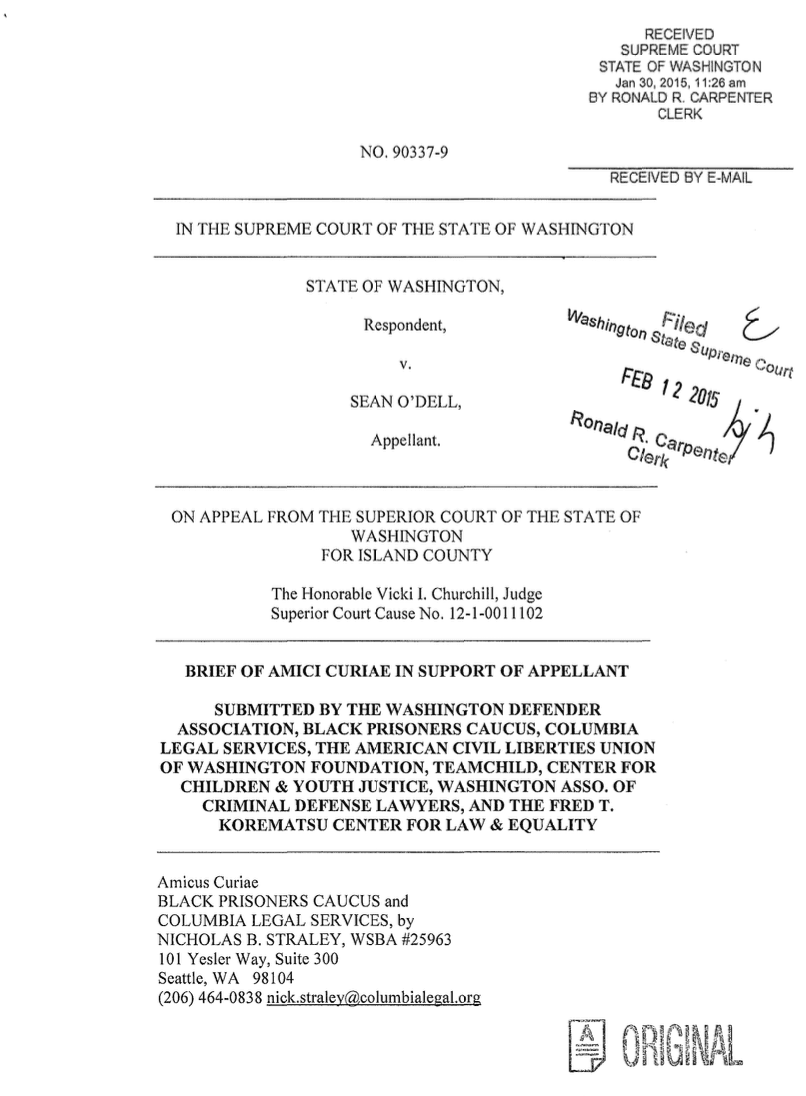
Summary of Argument
Recent neuroscience and precedent from the United States Supreme Court demonstrate that young people have different characteristics relevant to mitigation which should be considered during criminal sentencing. While not all youth will be eligible for a downward departure, the Sentencing Reform Act, RCW 9.94A.535(1)(e), grants courts the authority to consider whether a particular defendant’s youth mitigated his individual culpability for a crime, even if, like Mr. O’Dell, the young person has reached his 18th birthday.
In the last decade, the United States Supreme Court has handed down four landmark decisions profoundly altering the treatment of youth in the criminal justice system: Roper v. Simmons, 543 U.S. 551, 125 S.Ct. 1183, 161 L. Ed. 2d 1 (2005) (abolishing the death penalty for all youth under the age of 18);1 Graham v. Florida, 560 U.S. 48, 130 S.Ct. 2011, 176 L. Ed. 2d 825 (2010) (life without parole sentences for youth who commit non-homicide crimes ruled unconstitutional); J.D.B. v. North Carolina, __ U.S. __, 131 S.Ct. 2394, 180 L. Ed. 2d 310 (2011) (holding that the Miranda custody take into account the age of a juvenile); and Miller v. Alabama, __ U.S. __, 132 S.Ct. 2455, 183 L. Ed. 2d 407 (2012) (mandatory life without parole sentence for juveniles convicted of homicide crimes is unconstitutional). Each of these cases was premised on the scientific fact that adolescents as a group are neurologically, significantly different than adults and therefore generally less culpable for their crimes.
As the United States Supreme Court recognized in these cases, neurological development affects how young people think and act. That development impacts their understanding of consequences, their abilities to control their emotions, the relative influence of peers, and their decision-making. Recent neuroscience has proven that these transformational processes continue well into a young person’s twenties. These scientific facts render many youth less culpable than adults due to the innate qualities of their age and the manner in which those qualities affect them.
Undoubtedly, a defendant’s youth will not always result in a downward departure – youth is not an excuse for criminal behavior.However, it is relevant to a young person’s culpability for a particular crime and to the proportionality of the sentence.
Proportionate punishment for culpable behavior lies at the core of the criminal justice system generally, and the Sentencing Reform Act (SRA) specifically. See RCW 9.94A.010. The SRA allows a court to grant an exceptional sentence downward when “[t]he defendant's capacity to appreciate the wrongfulness of his or her conduct, or to conform his or her conduct to the requirements of the law, was significantly impaired.” RCW 9.94A.535(1)(e).
This case illustrates this point. Because Mr. O’Dell was 10 days beyond his 18th birthday at the time of the offense, his possible sentencewent from a maximum sentence of 36 weeks as a juvenile to a potential life sentence. Nonetheless, the sentencing court felt that it could not consider Mr. O’Dell’s youth or the science discussed herein when it sentenced him. In fact, the SRA grants courts the discretion to evaluate the particular individual circumstances in cases like Sean O’Dell’s in order to reach a decision that reflects modern science and achieves a proportionate, just outcome.
In the past, Washington courts have rejected the argument that youth is a valid mitigating factor in cases that predate the scientific breakthroughs in juvenile neuroscience discussed herein and the Roper/Graham/Miller line of cases. See e.g., Ha’mim 132 Wn.2d at 836 (young age at time of offense not a valid basis for a downward departure). This Court should reexamine those holdings and reach a result more in keeping with the language and intent of the SRA and one that accommodates modern science and more recent legal thinking.
While a defendant’s youth and its impact on his culpability for a particular crime is one factor that courts should be able to consider during sentencing, there are others as well. As the United States Supreme Court has recognized, a defendant’s intellectual disability may require a lesser sentence than would otherwise be imposed. See e.g. Atkins v. Virginia, 536 U.S. 304, 319-21, 122 S. Ct. 2242, 153 L. Ed. 2d 335 (2002) (death penalty may not be imposed upon person with intellectual disabilities and IQ of 70 or below). The SRA reflects this principle and allows courts the discretion necessary to reach a proportionate and just sentence in particular circumstances.
In this brief, amici first offer an examination of the effects of youthfulness on culpability. Second, amici show how the SRA allows youth to be considered at sentencing on a case by case basis. Third, amici discuss how other individual attributes, like the presence of an intellectual disability, should also be the basis for a downward departure in particular circumstances.